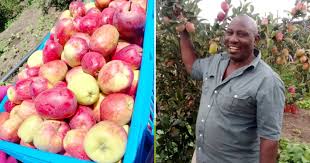Wambugu apple also known as semi-arid-apple is an organic grafted apple that can be grown anywhere around the world. Due to Climatic conditions, Apple farming has been a difficult thing in West Africa including Nigeria. Although this fruit bearing plant is very selective yet the fruit is liked by many people in our country.
That is why the rate of consumption’s keeps increasing daily. Apple is more preferred than other fruits with a higher price as one can go for as high as #50 or #100 depending on the size. It grows in a warm or hot temperature of about 36°C.
Most African countries import apple from South Africa and Israel. The cost of importing them down increases the price.It was because of this challenge that Wambugu a Kenya man formerly a mechanic started searching for solutions because the seedlings imported from Israel couldn’t grow in Kenya.
In his quest he went to the forest and cut the natural apple; grafted it with the seedling from Israel, boom! Wambugu apple was birthed; the yield was more than the imported.
Wambugu apple became the first apple tree that can be grown in warm regions . As such West African Countries can now conveniently cultivate apple successfully.

This is a golden opportunity for farmers and investors to go into apple farming for cool business. The number of people consuming apple keeps increasing every day as the knowledge of the benefits grows.
Before now it was mostly consumed by the high-class and middle class but now almost everyone craves for apple. It is said “one apple a day keeps you away from a Doctor”.
The reality on the ground however, is that we have an ever-growing demand for apples yet only a handful of apples are produced locally. What if you could start an apple farm, using locally-bred seedlings that unlike exotic ones require minimal care?
Wambugu apples or Wambugu farm can be grown in any soil type and weather but not in a waterlog area. For optimum growth and yield plant them in a sandy-loam soil.
Read Also: How to Cultivate Grafted Wambugu Apples
Wambugu Apple as a Rich Fruit

- They are rich in vitamins C, beta-carotene and B-complex as well as minerals such as potassium, phosphorous and calcium.
- Horticultural Crops Directorate notes the area under apples in 2014 increased by 33 per cent while yield and value increased by 93 per cent and 75 per cent respectively compared to the previous year. This saw the fruits fetch Sh26.3 million with a production of 714 tonnes.
In Summary
- Apples attract a handsome price in Kenya of up to Sh50 each since the fruits are largely imported from South Africa and Israel.
- Apples are planted in holes that are 60cm wide and 60cm deep spaced at 3 by 3m for better growth.
- Application of a growth regulator known as Dormex aids in dormancy breaking and ensuring uniform flowering.
Commercial growing of apple, a major crop in temperate countries, is slowly taking shape in Kenya as improved varieties are unveiled.
Being predominantly a temperate fruit requiring very low temperatures, the apple fruit has for a long time been considered exotic.
The Kenya Agricultural and Livestock Research organization, through its Horticulture Research Institute, is, however, keen to change the fortunes of the fruit in the country through the introduction of grafted varieties that can do well in areas with warm temperatures like Thika, Yatta and Busia.
However, the major producing counties include Baringo, Kiambu, Meru and Nyandarua.
The improved varieties that have been tested in different climatic regions include Fuji, Gala and Breaburn.
Read Also: How to Graft an Avocado Tree to Produce Avocado Fruit
Frequently Asked Questions
We will update this section soon.


How could it be possible to get wambugu apple seedlings in Nigeria if needed.
Good day,
Please I need the wambugu apple seedlings in Lagos. What is the cost.
Do you also have some other fruits seedlings?
Regards.